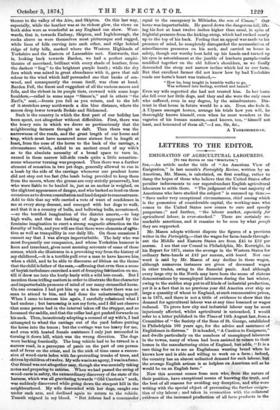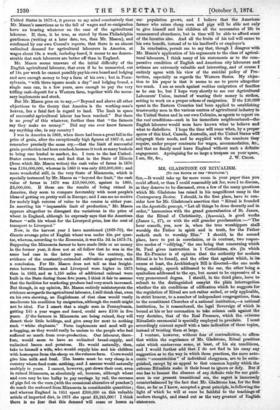LETTERS TO THE EDITOR.
EMIGRATION OF AGRICULTURAL LABOURERS.
[TO THE EDITOR OF THE "SPECTA.TOR."3
SIR,—An article under the title of "An American View of Emigration," in last month's Fortnightly Review, written by an American, Mr. Mason, is calculated, on first reading, rather to damp the hopes of those who believe that the United States offer peculiar inducements to our superabundant English agricultural labourers to settle there. " The judgment of the vast majority of Americans who have studied the subject" is summed up thus:— " Save under very exceptional circumstances, chief among which is the possession of considerable capital, the working-man who comes to the United States now comes to sure and speedy pauperism ;" and further, " the labour market, especially for agricultural labour, is over-stocked." These are certainly re- markable assertions, and it remains to be seen by what proofs they are supported.
Mr. Mason adopts without dispute the figures of a previous writer in the Fortnightly,—that the wages for farm-hands through- out the Middle and Eastern States are from £45 to £52 per annum. I see that our Consul in Philadelphia, Mr. Kortright, in his Report for 1871, states the average in the Western States for ordinary farm-hands at £42 per annum, with board. Not one word is said by Mr. Mason of any decline in these wages, although numerous instances are given of decreased wages in other trades, owing to the financial panic. And although every large city in the North may have been the scene of riotous demonstrations by unemployed labourers during the last winter, owing to the sudden stop put to all kinds of industrial production, yet it is a fact that in no previous year did America ever ship so large a quantity of wheat to England, at such remunerative prices, as in 1873, and there is not a tittle of evidence to show that the demand for agricultural labour was at any time lessened or wages reduced. To prove how city and industrial labour may be most injuriously affected, whilst agricultural is untouched, I would refer to a letter published in the Times of 14th August last, from a Committee of " the Society of the Sons of St. George, established in Philadelphia 103 years ago, for the advice and assistance of Englishmen in distress." It is headed, "A Caution to Emigrants," and dwells particularly on the numbers of unemployed labourers in the towns, many of whom had been assisted to return to their homes in the manufacturing cities of England, but adds, "It is a rare thing for us to see an Englishman wanting bread when he knows how and is able and willing to work on a farm ; indeed, the country has an almost unlimited demand for such labour, but the average English artisan is as helpless on American soil as he would be on an English farm."
Now this account comes from men who, from the nature of their position, have exceptional means of knowing the truth, and the best of all reasons for avoiding any deception, and who were writing with the special object of preventing the further emigra- tion of city labour ; and taken in connection with the collateral evidence of the increased production of all farm products in the United States in 1873-4, it proves to my mind conclusively that llitr. Mason's assertions as to the fall of wages and re-emigration have no bearing whatever on the case of the agricultural labourer. If, then, it be true, as stated by these Philadelphia gentlemen (writing at a later date, too, than Mr. Mason), and confirmed by our own Consul's reports, that there is an almost unlimited demand for agricultural labourers in America, at wages about 18s. a week, including board, it seems to me demon- strable that such labourers are better off than in England.
Mr. Mason seems unaware of the initial difficulty of the English agricultural labourer, that even if he be unmarried, out of 14s. per week he cannot possibly pay his own board and lodging and save enough money to buy a farm of his own ; but in Penn- sylvania, "with three square meals a day" and lodging found, a single man can, in a few years, save enough to pay the very trifling cash-deposit for a Western farm, together with the neces- sary implements and stock.
But Mr. Mason goes on to say,—" Beyond and above all other objections to the theory that America is the working-man's heaven, lies a fatal fact in regard to land. The limit in space of successful agricultural labour has been reached." But there is no proof of this whatever, further than that "the farmers say they make no money." Did any one ever know farmers say anything else, in any country ?
I was in America in 1869, when there had been a great fall in the price of grain, after the exceptionally high figures of 1867-8, and remember precisely the same cry,—that the limit of successful grain-production had been reached, because it took so many bushels to bring one bushel to market, &c. I turn to the last United- States census, however, and find that in the State of Illinois (from which Mr. Mason writes) the cash value of farms in 1870 was £184,000,000, whereas in 1860 it was only £82,000,000 ; and more wonderful still, in the very State of Minnesota, which is specially instanced by Mr. Mason as "beyond the limit," the cash value of farms in 1870 was £19,000,000, against in 1860, £6,000,000. If these are the results of being ruined in America, they seem to compare favourably with most people's ideas of getting on pretty well in Europe; and I can see no motive for unduly high returns of value to the census in either year. In asserting his " impassable limit of production," Mr. Mason appears altogether to disregard the variations in the price of wheat in England, although he expressly says that the American fanner "sells his wheat for the Liverpool price, less the cost of transport to Liverpool."
Now, in the harvest year I have mentioned (1869-70), the Gazette average price of English wheat was under 45s. per quar- ter, whereas, according to the Economist, it was 61s. 3d. in 1873-74. Supposing the Minnesota farmer to have made little or no money in the former year, it does not at all follow that he was in the same bad case in the latter year. On the contrary, the evidence of the constantly-extended cultivation negatives such a conclusion. For Mr. Mason does not tell us that freight- rates between Minnesota and Liverpool were higher in 1873 than in 1869, and as 1,150 miles of additional railroad were built in the State during those five years, I think it fair to assume that the facilities for marketing produce had very much increased. But though, in my opinion, Mr. Mason entirely misinterprets the evidence as regards the agricultural labourer, I still think that, even on his own showing, an Englishman of that class would vastly ameliorate his condition by emigration, although the result might not be ideal. For I assert that a single man in Pennsylvania, getting £45 a year wages and board, could save £100 in five years. If the farmers in Minnesota are being ruined, they will desert their little holdings, and give away for next to nothing such " white elephants." Farm implements and seed will go a-begging, as they would really be useless to the people who had suffered so much from over-production. Our labourer, there- fore, would seem to have an unlimited bread-supply, and unlimited bacon and potatoes. He would naturally, then, take to himself a wife, who would supply him and his children with homespun from the sheep on the ruinous farm. Cows would give him milk and beef. The beasts must be very cheap in a country where feed costs nothing, and I assume would naturally multiply in years. I cannot, however, put down their cost, even in ruined Minnesota, as absolutely nil, because, although wheat and corn may be too bulky to pay carriage by rail, the carcases of pigs fed on the corn (with the occasional alterative of peaches!) do reach the seaboard from Minnesota in considerable quantities ; and whereas England in 1851 spent £300,000 on this valuable article of imported diet, in 1873 she spent 26,245,0001 I think there is no fear that this demand will cease or lessen as
our population grows, and I believe that the American farmer who raises cheap corn and pigs will be able not only to give himself and his children all the necessaries of life in unmeasured abundance, but in time will be able to afford some of the luxuries also. And all the fruits of his toil will enure to. his own benefit, instead of to his landlord's or employer's.
In conclusion, permit me to say that, though I disagree with Mr. Mason's application of his arguments to the class of agricul- tural labourers, I think many of his statements as to the com- parative condition of English and American city labourers and artisans are extremely valuable and interesting, and of course I entirely agree with his view of the suicidal policy of Pro- tection, especially as regards the Western States. My objec- tion to his paper is that it seems to me to prove altogether too much. I am as much against reckless emigration of families as he can be, but I hope very shortly to see our Agricultural Labourers' Union, instead of wasting their money in strikes, setting to work on a proper scheme of emigration. If the £20,00() spent in the Eastern Counties had been applied to establishing trustworthy men in the various centres of agricultural industry in the United States and in our own Colonies, as agents to report on the real conditions—each in his immediate neighbourhood—the- English labourer would soon have known what to believe and what to disbelieve. I hope the time will come when, by a proper- system of this kind, Canada, Australia, and the United States will telegraph their needs, and be supplied with the numbers they require, under proper contracts for wages, accommodation, &c., and that no family need leave England without such a definite engagement. Apologising for so large a trespass on your space,



































 Previous page
Previous page